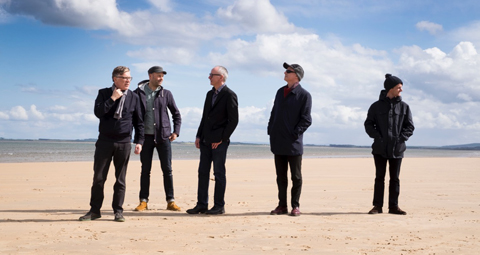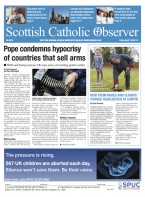December 2 | ![]() 0 COMMENTS
0 COMMENTS ![]() print
print

Fan club not just for teens
Teenage Fanclub are famous for three-part harmonies and Sixties-inspired pop songs. Norman Blake explains to RICHARD PURDEN how it all began with A Catholic Education
THIS weekend Teenage Fanclub’s Norman Blake will return home to Glasgow for two special sold-out shows, one at the city’s renowned Barrowland Ballroom. In September the band released a critically acclaimed 10th studio album, Here.
The vocalist, guitarist and songwriter suggests, “We don’t want to be a nostalgia band—we always want to play our latest music.”
Since forming in 1989, Teenage Fanclub have survived various music industry changes and shifting scenes.
Mr Blake, 51, explained why they’ll always belong to Glasgow, despite being affectionately known as the Bellshill Beatles. “I’m the only one from Bellshill and really we see ourselves as a Glasgow band–we have since our early days,” he said.
Another misconception, currently on Wikipedia, suggests that the band were attacking the Catholic Church with the title of their debut album, A Catholic Education. In truth it was an ‘irreverent’ title referencing the experience of some band members.
“A Catholic Education was an irreverent thing, we thought it would get a reaction living in the west of Scotland and we knew people would say ‘what do they mean, what’s that all about,’ kind of thing. I wasn’t Catholic but I think we wanted to provoke a response,” Mr Blake said.
“Certainly no one was angry with us for calling it that. We also meant it in the other meaning of Catholic being eclectic and bringing a lot of influences to the band. We just thought it sounded good as well.”
Do you still play your first single from the record Everything Flows?
“That’s the song we still play every single night and I can still just about relate to the guy who wrote it,” Mr Blake said. “There are some old songs I wouldn’t like to play because I’m embarrassed by the lyric but that one doesn’t bother me too much.
“I subconsciously ripped off the line everything flows from The Beatles song Glass Onion. We were also listening to a lot of Sonic Youth at that time and Exile On Main Street by The Rolling Stones—we were a bit heavier then.”
Although Teenage Fanclub haven’t been famous for writing about politics, it’s been widely observed that recent song Hold On contains the lyric “I don’t hear much fanfare for the common man these days.”
Despite living through a dark era, they wrote some of the most anthemic alternative rock songs of the 1990s.
Norman said: “We grew up around Ravenscraig (the closure of the steelworks), the miners’ strike and high unemployment. We’re all interested in politics but it’s never been part of our music because it doesn’t really fit.
“I can’t speak for all the guys in the band but Gerry (Love) and I grew up in Lanarkshire in the 1980s and it was pretty grim.
“Leaving school there weren’t many prospects, the careers officer at my school had a tough job at the time. Raymond (McGinley, another of the band’s three songwriters) grew up in Maryhill and it was the same thing.
“In Glasgow, I remember a lot of ruined buildings and rubble, this was before the buildings were sandblasted and before the point where Glasgow rediscovered itself as a city of telesales or whatever it has become now.”
In the post-industrial era, it was from his parents’ flat in Maryhill that the enterprising McGinley negotiated Teenage Fanclub’s first record deal in America.
“Raymond had a fax machine at home and was sending messages back and forth. We have always been okay in terms of the business, I don’t think we have been ripped off and we were lucky with Creation (Records) and people like Alan (McGee),” Mr Blake said.
TFC became associated with some of the biggest musical movements of the 1990s with both Kurt Cobain of Nirvana and Liam Gallagher of Oasis giving the band high praise. Norman said: “I met Kurt with Eugene (Kelly) of The Vaselines in Edinburgh—he had asked Eugene to reform the band to support Nirvana.
“Kurt turned round and said to Eugene ‘I can’t believe I’m meeting you.’ We supported them with Nevermind on the European dates. It was really exciting to witness this phenomenon with Nirvana. They were becoming massive and it was also interesting to see a band get that big in such a short period of time, the adulation was unbelievable; it was something else.”
You were also a Creation band but seemed quite separate from the other acts on the label and the scene in general?
“Well, I think it was because we were in Glasgow and Alan (McGee) and the label was in London,” Mr Blake said.
“We would come down to play shows and pick up some records. Creation was amazing and Alan signed a lot of great bands.
“Felt were very influential, also bands like My Bloody Valentine. Alan released a lot of really important records, the Oasis thing was incredible and it made the label successful because it was running out of money, that enabled a lot of people to make music, us included.”
You also had an association with another Creation band, Primal Scream, and Bobby Gillespie’s club night in Glasgow?
Mr Blake explained: “Yes, Splash One, we were part of that and, in fact, I met Raymond in the band there. I went on my first European road trip with The Pastels through it as well. Bobby is still a friend, he’s a good guy but we’ve not seen him for a long time.”
Today, Mr Blake lives in Canada with his wife and is the father of a 20-year-old daughter who studies in Glasgow. He suggests the band’s Grand Prix album remains his favourite as ‘it was when I met my wife and was an important time in my life, as a band it was a return to form.’
Does living in Canada change dynamics with the rest of the group who remain in Scotland?
“Not really, with the internet I keep in touch with everyone on email every day and we use Skype,” Mr Blake said.
Canada it seems is a home from home. “You meet tons of Scots over there,” Mr Blake explained. “My wife’s family are from Ayr—a village in North Dumfries, Ontario. They have other place names like New Dundee and every second person you meet has a parent or grandparent from Scotland.”
Teenage Fanclub play in Glasgow at the Barrowland on December 3 and the ABC the following night










